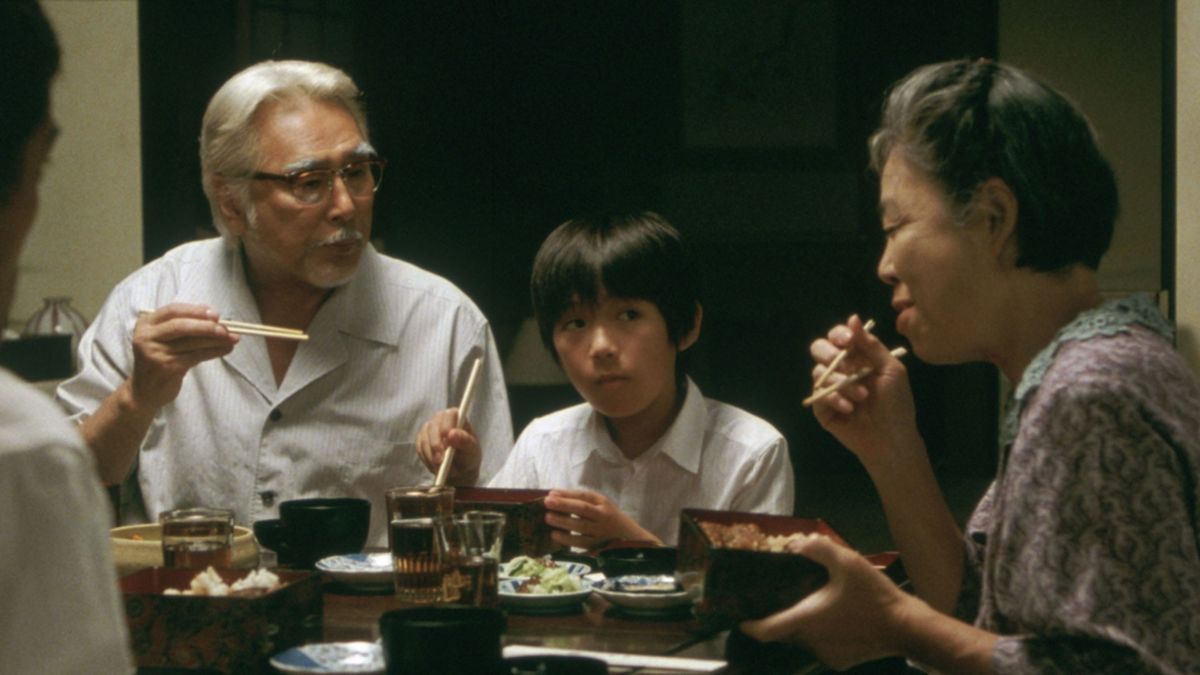The two surviving progeny provide their parents with both pride and irritation at not making the exact decisions they might’ve made. Son Ryota (Hiroshi Abe) is introducing everyone to his new wife, the recently widowed Yukari (Yui Natsukawa) and new stepson Atsushi (Shohei Tanaka), an arrangement that Toshiko and her gruff retired doctor husband Kyohei (Yoshio Harada) view as less than ideal. Daughter Chinami (Yukiko Ehara) is probably going to move in to her parents’ home with her husband and two adorable children, but the details aren’t set and there’s friction that can’t help but rear its head during a weekend where the interested parties are attempting to avoid it. Amongst these nine characters are small encounters that are rife with drama. That this drama is low on the stakes scale detracts not at all from the pleasure of Still Watching, thanks to Koreeda’s precise habit of making emotional stakes as potent as life-and-death ones.
As pleasant as it is to watch Chinami’s kids wrestle with a watermelon or Atsushi wander into Kyohei’s office for a surprisingly gentle chat, there is a sadness that hangs over the film. One gets the impression that Toshiko has cried all the tears she had over her dead son Junpei, and her grief is now a frankness towards the loss that slightly unnerves the rest of her family. This discomfort is especially apparent in the ritualistic arrival of the person that Junpei died saving, a child at the time who has since grown into an underachieving and overweight young man. Obligated to come due to the life he owes to this family, the young man’s embarrassment is succor to Toshiko, an odd, vindictive reaction that nonetheless feels exactly right. Within the family, the least surprising facet of the film is how Kyohei has put his dead son on a pedestal at the expense of his live one, a dynamic that lacks the imagination of how Toshiko and Kyohei feel about the man Junpei saved. The background sadness amongst everyone occasionally rises to the surface as characters lash out or share secrets from a desire to wound each other, demonstrating that the initial scenes of bliss may have been borne out of absence, and within a few hours of pleasantries, the sniping can begin.
Koreeda uses actors over and over again in his films, particularly Kiki and Abe, and it’s no surprise that both are exceptional as usual. Kiki’s wizened, gentle, acerbic old woman isn’t so different from the one she plays in Shoplifters or Our Little Sister, but she’s great at this type for this director. Abe is more stern and put-upon than his teacher in I Wish, and his Ryota ensures that the frustration comes from an understandable place. Speaking of the child-led I Wish, Koreeda’s facility with young actors is again on display in Still Walking, as he and Tanaka beautifully create the mannerisms and gradual openness of a kid acclimating himself to a scenario in which he’s the outsider amongst people who are trying to get him comfortable. Atsushi’s tentativity, especially in the face of his boisterous step-cousins, is irresistible. Lastly, Harada’s patriarch comes ready-made to generate the feels, as the withholding grandpa who’s not so withholding in private is a trope that can only work. A character who occupies the least sympathetic space due to his oft-rude actions, the film makes sure to give Kyohei some grace notes that wordlessly demonstrate the frustrated position he currently exists in.
Koreeda is the most consistent of directors whenever he chooses to make a film like Still Walking. It’s an obvious and unsurprising thing to say that the Japanese master again creates a lived-in environment, packed with meaning and memorable tableaus of everyday life. While the lack of a dramatic hook puts other Koreeda works like Our Little Sister and Life Father, Like Son slightly above this doesn’t mean that the viewer can’t get lost in the flow of Still Walking. B+

 RSS Feed
RSS Feed